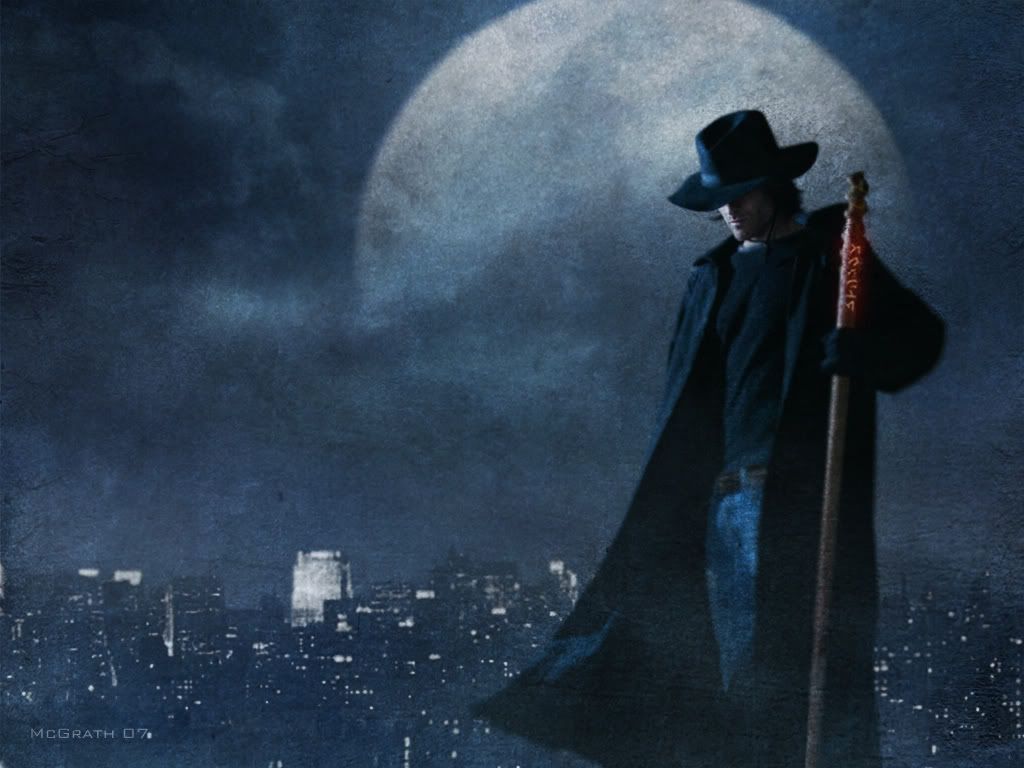Yes, yes, yeeezzz..... oh yes!
I think I'm falling in love with an electronic device and I'm not the less ashamed to confess this...paraphilia? to you, who are my dear friends and who, I trust, will look at me with broad-mindedness and indulgence.
My Kindle has become, since it arrived home two weeks ago, one of my favourite gadgets and has nothing to envy any of the former most-loved ones. With its beatiful design, light weight, nice -so nice- touch it has stolen my heart. I was definitely seduced from the first moment it reached my hands and switched on all by itself when I plugged it in order to charge the battery.
But now I fear that within a few months I will find myself writing a post starting with "Hi, my name is Ronronia and I'm addicted" cause this is the list of the books I've bought so far:
5 first books in the Charlie Parker's series, by John Connolly: Every dead thing, Dark hollow, The killing kind, The white road and The black angel. Ok, this is not sci-fi nor fantasy but the guy sees dead people so perhaps stretching the concept a little...I specially like two characters in those books, the unlikely gay couple formed by Loui, an enigimatic, large black man who was a hired killer but who now seems to be in semiretirement and Angel, a small white man and ex-burglar. Rich, hard as hell, introspective prose.
2nd, 3rd and 4th books in the Nightside series, by Simon R. Green: Agents of light and darkness,
Nightingale's lament and Hex and the City (but we'll talk about this series in another post.)
South: the story of Shackleton's 1914-1917 expedition by Shackleton, Sir Ernest Henry: and this one is free, free, free, can you believe it? (Please, if you have not done it yet, please read Cherry-Garrard's The Worst Journey in the World cause it's the best travel book ever and a most astonishing tribute to human ability to endure suffering)
Two curiosities by Mary Roach: Bonk: The Curious Coupling of Science and Sex and Stiff: The Curious Lives of Human Cadavers, to read in fits and starts, and one by Gregory Leland, Stupid History: Tales of Stupidity, Strangeness, and Mythconceptions Throughout the Ages (and none exceeded 3$)
And finally, George R.R. Martin's A song for Lya and Portraits of his Children.
So now you know why I'm not posting about Dune just as planned and the reason is that posting about such a huge masterpiece needs its well deserved care and time and I'm at present absorbed by my new acquisitions.
By the way, have I already sponken of how confortable are the screen and keyboard in my superb brand-new Kindle?
I think I'm falling...
Science-Fiction and Fantasy books. What we read and why we love the genre.
Nov 27, 2010
May a woman fall in love with... a Kindle?
Nov 19, 2010
John Ajvide Linqvist : Handling the undead
Sweden has been hit with a weird medical happening over the last two months. Due to excessive heat levels and energy spikes, the dead seem to have returned to life. Well, it's not like all of the deceased Swedes have returned to life. I'd say a good estimate would put it around 10% of the deceased population has returned. Several citizens mark this resurrection with a degree of horror and hope. The recently widowed, orphaned and general grieving are hoping that this means their loved ones will return hope. Others fear what sort of horrors that the walking dead bring with them.
The undead of this book aren't ghouls, but they aren't normal. These undead are shells of their former selves who are trying to return to their past lives. What makes this more of a tease is that so many grieving individuals are seeing these creatures and wanting their loved ones to come back.
The horror begins, as we find two grieving individuals that are desperate to be visited by a relative zombie. When the grandfather Mahler learns of the dead's return, he gets the idea that his deceased grandson might be alive in his coffin. Fighting against reason, he breaks into the local graveyard and begins to unearth the eight year old child. The readers get to follow along, as his troubled mind tries to rationalize his actions until he finally breaks the coffin lid. Feeling inside against the exposed bone, he realizes that his grandson hasn't returned as the same child. The sense of disgust and personal horror is what helps to drive the true terror of this work.
Linqvist slowly weaves together an intelligent, philosophical look at what would happen if the dead were to unnaturally rise from their graves. "Handling the Undead" doesn't really focus on the zombies themselves. Instead, Lindqvist conjures up a simple scenario, and examines how people would react to it -- we see hysteria, suicide, denial, dismissal, religious fervor, and a delusional belief that the zombies can simply go back to their old lives. And he brings up a number of philosophical questions with no easy answers.
In a book filled with subtle, creeping psychological horror, the author also fleshes out his characters beautifully, giving each one a backstory that shapes their current reactions. And he handles each one with compassion, even if they're delusional or twerpy.
Although perhaps a bit slow in the middle, this is a horror novel that transcends its genre by showing what the return of the dead might really mean to those who loved them.
To know more and better:
http://www.amazon.com/Handling-Undead-John-Ajvide-Lindqvist/dp/0312605250
http://en.wikipedia.org/wiki/Handling_the_Undead
http://chud.com/articles/articles/25060/1/BOOK-REVIEW-HANDLING-THE-UNDEAD-/Page1.html
The undead of this book aren't ghouls, but they aren't normal. These undead are shells of their former selves who are trying to return to their past lives. What makes this more of a tease is that so many grieving individuals are seeing these creatures and wanting their loved ones to come back.
The horror begins, as we find two grieving individuals that are desperate to be visited by a relative zombie. When the grandfather Mahler learns of the dead's return, he gets the idea that his deceased grandson might be alive in his coffin. Fighting against reason, he breaks into the local graveyard and begins to unearth the eight year old child. The readers get to follow along, as his troubled mind tries to rationalize his actions until he finally breaks the coffin lid. Feeling inside against the exposed bone, he realizes that his grandson hasn't returned as the same child. The sense of disgust and personal horror is what helps to drive the true terror of this work.
Linqvist slowly weaves together an intelligent, philosophical look at what would happen if the dead were to unnaturally rise from their graves. "Handling the Undead" doesn't really focus on the zombies themselves. Instead, Lindqvist conjures up a simple scenario, and examines how people would react to it -- we see hysteria, suicide, denial, dismissal, religious fervor, and a delusional belief that the zombies can simply go back to their old lives. And he brings up a number of philosophical questions with no easy answers.
In a book filled with subtle, creeping psychological horror, the author also fleshes out his characters beautifully, giving each one a backstory that shapes their current reactions. And he handles each one with compassion, even if they're delusional or twerpy.
Although perhaps a bit slow in the middle, this is a horror novel that transcends its genre by showing what the return of the dead might really mean to those who loved them.
To know more and better:
http://www.amazon.com/Handling-Undead-John-Ajvide-Lindqvist/dp/0312605250
http://en.wikipedia.org/wiki/Handling_the_Undead
http://chud.com/articles/articles/25060/1/BOOK-REVIEW-HANDLING-THE-UNDEAD-/Page1.html
Etiquetas:
Author - John Ajvide Linqvist,
Fantasy - Urban,
Terror - Zombies
Nov 14, 2010
John Ajvide Linqvist : Let the right one in
John Ajvide Lindqvist (born 2 december 1968 in Blackeberg, Sweden) is a Swedish writer, mostly of horror novels and short stories. His debut novel Let the Right One In (Låt den rätte komma in) a romantic, social realistic vampire horror story published in 2004.
Synopsis: 12-year-old Oskar is an outsider; bullied at school, dreaming about his absentee father, bored with live on a dreary housing estate. One evining he meets his mysteriour neighbour Eli. As a romance blossoms between them, Oskar dicovers Eli's dark secret - she's a 200-year-old vampire, forever frozen in chidhood and condemned to live on a diet of fress blood.
 It could very well be another vampire story but the author achieves in fact a disturbing reworkin of the vampire legend, and a deeply moving fable about rejection, friendship and loyalty, and shows a vampire both heart-breakingly pathetic and terrifying.
It could very well be another vampire story but the author achieves in fact a disturbing reworkin of the vampire legend, and a deeply moving fable about rejection, friendship and loyalty, and shows a vampire both heart-breakingly pathetic and terrifying.
The book is a bevy of contradictions: beauty and horror, young love and violence, innocence and guilt. The fact that it works at all is impressive, being as it is part love story, horror novel and social drama.
After this one, I'm reading Handling the Undead. I'll tell you something about this one as soon as I finish it but my first impression is that this one is even a more disturbing and ill-at-ease reading.
Synopsis: 12-year-old Oskar is an outsider; bullied at school, dreaming about his absentee father, bored with live on a dreary housing estate. One evining he meets his mysteriour neighbour Eli. As a romance blossoms between them, Oskar dicovers Eli's dark secret - she's a 200-year-old vampire, forever frozen in chidhood and condemned to live on a diet of fress blood.
 It could very well be another vampire story but the author achieves in fact a disturbing reworkin of the vampire legend, and a deeply moving fable about rejection, friendship and loyalty, and shows a vampire both heart-breakingly pathetic and terrifying.
It could very well be another vampire story but the author achieves in fact a disturbing reworkin of the vampire legend, and a deeply moving fable about rejection, friendship and loyalty, and shows a vampire both heart-breakingly pathetic and terrifying. The book is a bevy of contradictions: beauty and horror, young love and violence, innocence and guilt. The fact that it works at all is impressive, being as it is part love story, horror novel and social drama.
After this one, I'm reading Handling the Undead. I'll tell you something about this one as soon as I finish it but my first impression is that this one is even a more disturbing and ill-at-ease reading.
Etiquetas:
Author - John Ajvide Linqvist,
Terror - Vampires
Nov 12, 2010
Asimov: I'm in Marsport without Hilda
and 13 other detective short stories published in 1968 as a collection under the title "Asimov Mysteries".
Four stories in the collection feature the character of Wendell Urth, who is a leading extra-terrologist (an expert on alien worlds and life originating on them). Urth is eccentric in that he has a phobia of all mechanical forms of transport (an exaggeration of Asimov's own aversion to flying) but they all have one common feature: detective mysteries showing Asimov theory that science fiction is a literary genre but it can develop into all the popular genres: romantic, western, adventure, terror,... anyone and all of them.
As for this collection, is well known Asimov's passion for detective stories, he never tired of proclaiming his admiration for Agatha Christie, and these stories are selected because they are markedly police & criminal stories, detective stories full of mystery. Most are not convoluted stories, they are not full of red herrings or lacking information, and follow the same general pattern: Asimov raises the mystery or problem -that is clearly stated in the first half- and in the second half the solution is given without further artifice.
Asimov has always been accused of being a misogynist (women characters are the exception in his work) and prudish. About "I'm in Marsport without Hisda, he says that attempted to pull off that sanbenito, or at least show that he was able to write something "spicy" (and, in my opinion, he failed miserably cause spicy, spicy... he's really prudish, Asimov :)))
But these are very funny stories followed by notes where the author explaines how sometimes science has rendered obsolete or disproved parts of them but he still did not want to change the story because of something as unimportant as reality.
Four stories in the collection feature the character of Wendell Urth, who is a leading extra-terrologist (an expert on alien worlds and life originating on them). Urth is eccentric in that he has a phobia of all mechanical forms of transport (an exaggeration of Asimov's own aversion to flying) but they all have one common feature: detective mysteries showing Asimov theory that science fiction is a literary genre but it can develop into all the popular genres: romantic, western, adventure, terror,... anyone and all of them.
As for this collection, is well known Asimov's passion for detective stories, he never tired of proclaiming his admiration for Agatha Christie, and these stories are selected because they are markedly police & criminal stories, detective stories full of mystery. Most are not convoluted stories, they are not full of red herrings or lacking information, and follow the same general pattern: Asimov raises the mystery or problem -that is clearly stated in the first half- and in the second half the solution is given without further artifice.
- "The Singing Bell" (1954, a Wendell Urth story)
- "The Talking Stone" (1955, a Wendell Urth story)
- "What's in a Name?" (1956)
- "The Dying Night" (1956, a Wendell Urth story)
- "Pâté de Foie Gras" (1956)
- "The Dust of Death" (1957)
- "A Loint of Paw" (1957)
- "I'm in Marsport Without Hilda" (1957)
- "Marooned Off Vesta" (1939)
- "Anniversary" (1959, a Multivac story)
- "Obituary" (1959)
- "Star Light" (1962)
- "The Key" (1966, a Wendell Urth story)
- "The Billiard Ball" (1967)

Asimov has always been accused of being a misogynist (women characters are the exception in his work) and prudish. About "I'm in Marsport without Hisda, he says that attempted to pull off that sanbenito, or at least show that he was able to write something "spicy" (and, in my opinion, he failed miserably cause spicy, spicy... he's really prudish, Asimov :)))
But these are very funny stories followed by notes where the author explaines how sometimes science has rendered obsolete or disproved parts of them but he still did not want to change the story because of something as unimportant as reality.
Etiquetas:
Author - Asimov,
Sci-Fi - Detectives,
Sci-Fi - Short Stories
Nov 6, 2010
Jim Butcher : Dresden Files
Harry Blackstone Copperfield Dresden is a very particular kind of private investigator. As a matter of fact he's the only one listing in the phone book under "Wizards". Although considered among his colleagues as a magical "thug" and accused of lacking fine control of his power, he's one of the strongest living wizards in terms of pure magical strength. Despite his traditional magic weapons (leather duster, rune staff, blasting rod, shield bracelet, silver ring and silver pentacle amulet) Harry has also been known to carry around many firearms such as a .38 revolver, a .357 and most recently a .44 revolver and a sawed-off shotgun for those times when 'magic just doesn't cut it'.
| Amazing variety of rune staffs. Which of them you thing Harry would choose? |
 He lives in a basement with his principal associate, Bob, a spirit of knowledge -the equivalent of a magical encyclopedia- living in a skull, and a Foo Dog called Mouse possesed of quasi-human intelligence and able to detect supernatural evil.
He lives in a basement with his principal associate, Bob, a spirit of knowledge -the equivalent of a magical encyclopedia- living in a skull, and a Foo Dog called Mouse possesed of quasi-human intelligence and able to detect supernatural evil.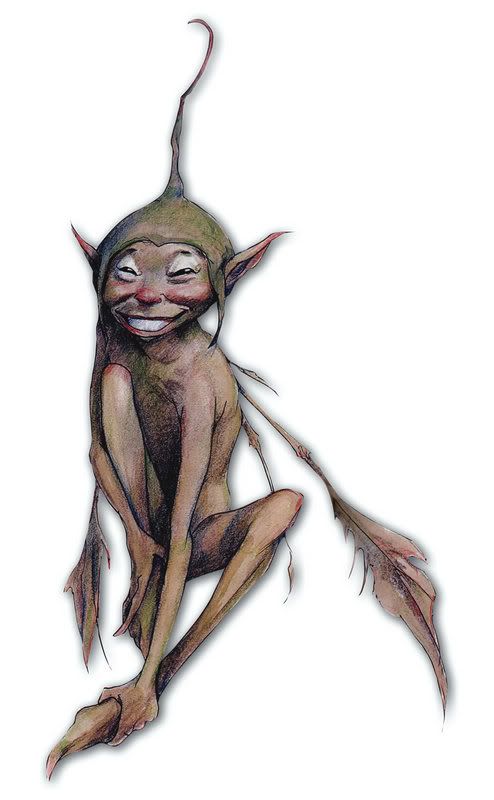 Complementing Mouse is Harry's crew of loyal, pizza-bribed pixies, serving as scouts and spies and informers...and keeping the mice out of his home, under the leadership of the empowered pixie Major General Toot-toot.
Complementing Mouse is Harry's crew of loyal, pizza-bribed pixies, serving as scouts and spies and informers...and keeping the mice out of his home, under the leadership of the empowered pixie Major General Toot-toot.Harry is a member of the White Council as a full Wizard, and has also been drafted into the Wardens, the combat-capable members of the Council, after their losses fighting the Red Court (the seat of vampiric power, the bad guys)
Last and most formidable of his particular circle of magical associates is his Fairy Godmother, the Leanan Sidhe. Considered the second most powerful member of the Winter Court, she has been tasked with protecting Harry and takes the job very seriously. You'll have to get acquainted to Winter and Summer fairies if you want to know why on earth did Harry get appointed Winter Knight or why his mother Margaret Gwendolyn LaFey bequeathed him a half brother, Thomas, who happens to be a White Court vampire, one who doesn't delight in blood but in the sickly submission that his sex appeal raises in his victims.
This is the complete series of books published so far with Harry as the protagonist:
Storm Front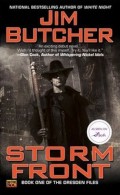 | Fool Moon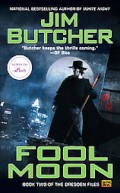 | Grave Peril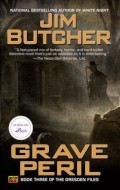 | Summer Knight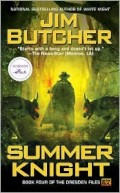 |
Death Masks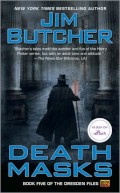 | Blood Rites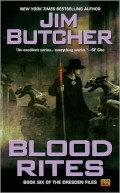 | Dead Beat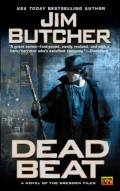 | Proven Guilty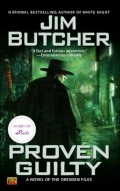 |
White Night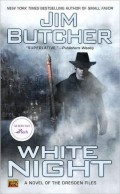 | Small Favor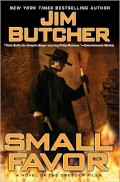 | Turn Coat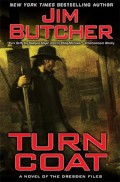 | Changes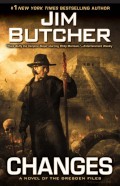 |
Side Jobs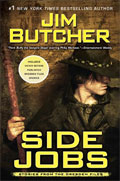 (short stories) | Ghost Story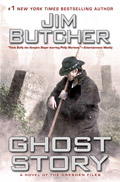 |
As Martina E. Balint says in Amazon Customers Review: Harry Dresden, the series' protagonist, is everything that's great about the hardboiled anti-hero, with a twist: He's a wizard trying to make a living working practical magic in a modern world that's foolishly rejected the supernatural in favor of science and technology. Part average guy, part renaissance man, Harry's got a dark side, a wicked sense of humor and a deeply rooted, personal code of honor that drives him to risk everything to fight the supernatural forces preying on his clients, an attitude that puts him at constant, dangerous odds with both the bad guys and the authorities alike.
Jim Butcher is himself a curious character: a martial arts enthusiast with fifteen years of experience in various styles including Ryukyu Kempo, Tae Kwan Do, Gojo Shorei Ryu, and a sprinkling of Kung Fu. He is a skilled rider and has worked as a summer camp horse wrangler and performed in front of large audiences in both drill riding and stunt riding exhibitions.
He also enjoys fencing, singing, bad science fiction movies and live-action gaming. He lives in Missouri with his wife, son, and a vicious guard dog. Butcher goes by the moniker Longshot in a number of online locales. He came by this name in the early 1990's when he decided he would become a published author. Usually only 3 in 1000 who make such an attempt actually manage to become published; of those, only 1 in 10 make enough money to call it a living. The sale of a second series was the breakthrough that let him beat the long odds against attaining a career as a novelist.All the same, he refuses to change his nickname.
Etiquetas:
Author - Jim Butcher,
Fantasy - Series,
Fantasy - Urban
Subscribe to:
Posts (Atom)











